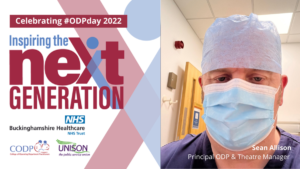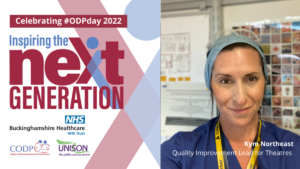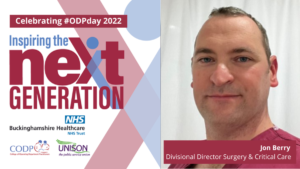‘Secret weapons’ of the operating theatre reveal hidden role on ODP Day
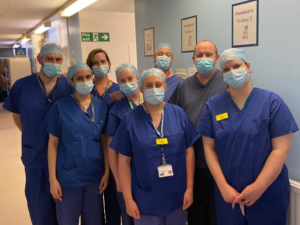 To celebrate national ODP Day this week (14 May 2022), Operating Department Practitioners (ODPs) at Buckinghamshire Healthcare NHS Trust (BHT) are shining a light on their hidden role to inspire the next generation of local talent.
To celebrate national ODP Day this week (14 May 2022), Operating Department Practitioners (ODPs) at Buckinghamshire Healthcare NHS Trust (BHT) are shining a light on their hidden role to inspire the next generation of local talent.
The only healthcare professionals trained specifically to care for patients in the operating theatre, ODPs are crucial members of the team during anaesthesia, surgery and recovery.
This ODP Day, our ODPs are:
- sharing stories about their career pathways and what attracted them to the role (read these below);
- creating a display stand at Stoke Mandeville Hospital – talking to visitors and demonstrating anaesthetic and surgical equipment;
- teaming up with lecturers on Buckinghamshire New University’s (BNU) ODP degree course to deliver career talks to students at Holmer Green Secondary School and Buckinghamshire College Group.
Sean Allison, Principal ODP & Theatre Manager at BHT, explains: “We’re often the last person a patient sees just before they go to sleep and are the anaesthetist’s secret weapon! We care for patients before, during and after operations and are responsible for managing theatre preparation. This ODP Day we’re making our hidden gem of a profession more visible by sharing our career stories and teaming up with BNU to show young people and anyone considering a career change the opportunities it offers in Bucks.”
18 year old Aaron Absalom, currently in Year 13 at Holmer Green Senior School, has been offered a place on the ODP programme at BNU this September: “I’m looking forward to directly caring for patients and being a valued member of a team. I was inspired by an ODP who talked to us at school who explained that every day is different working and you get to interact with such a wide range of people. I hope to return to school one day to inspire others to follow in my footsteps.”
Shane Roadnight, Associate Professor Perioperative Practice at Buckinghamshire New University, said: “From the start of our exciting ODP programme in 2011, we’ve worked closely with Buckinghamshire Healthcare NHS Trust to offer clinical placements for students. Our graduates go on to gain employment within the Trust and continue to enhance surgical care of patients. At BNU we’re keen to inspire the next generation to take up this rewarding, highly skilled profession: the perfect career pathway is right on their doorstep.”
Find out more about becoming an ODP:
- Read the BHT ODP inspiring the next generation stories on Facebook, Twitter and LinkedIn
- Watch Gemma Blazer’s career chat about being an ODP at Buckinghamshire Healthcare NHS Trust
- Watch Kym Northeast’s video about her journey from Healthcare Support Worker to ODP at Buckinghamshire Healthcare NHS Trust
- Find out about the BSc (Hons) Operating Department Practice at Buckinghamshire New University and watch an insight from students
- Visit the NHS Healthcareers website to find out more about becoming an ODP
Read our ODP career stories to see what inspired their journey:
Sean Allison, Principal ODP & Theatre Manager
How it all began: I left school at 18 having completed A-levels with no real idea of what I wanted to do. I always had an interest in the sciences and had worked in the summer holidays at a local hospital as a pharmacy porter. I saw an advert in the local paper for Operating Department Assistants (ODAs) and having read what this role entailed, I applied for various posts and eventually chose Ealing General Hospital to start my ODA training in 1983.
I qualified in 1985 and have slowly worked my way up the management ladder, through various name changes as well (ODA, Medical Technical Officers, ODP) and am now the Principal ODP & Theatre Manager at Buckinghamshire Healthcare NHS Trust. I have worked in many different hospitals in my career, covering many different surgical specialities.
The one thing that has been a constant in all of these theatres is the camaraderie and team working ethic among not just the ODPs, but all of the wider theatre teams. They become like family to you and you know that they will always be there to support you through the good times and the bad.
What attracted me to the ODP role: I was attracted by the diversity and the very hands on aspect of the role. Every day is different, and you meet many different people from all walks of life. The support network within theatres is amazing, with everyone looking out for each other.
How has my ODP training and experience helped me progress to my current role: I am organised, which is part and parcel of being an ODP, and also have a good work ethic and enjoy team working. Problem-solving in an emergency and lateral thinking are something ODPs do very well and this has transferred in to my current role. I have also taken the most positive aspects of all of my managers and encompassed these into my own personal management style.
Kym Northeast, Quality Improvement (QI) Lead for Theatres
How it all began: I always knew I wanted to work in a caring role and one day, while skimming the adverts in the local paper, I spotted a job as a Healthcare Assistant (HCA) in the Day Surgery Unit at Stoke Mandeville Hospital. Unknown to me at the time, this job would change my path in life, although my first day was interesting! Having always been a little wobbly around the sight of blood, while watching the first ever cannula be inserted I hit the deck, banging my head on the way down! Fortunately, I overcame this and continued my journey from HCA and worked my way up the ODP ranks and am now the quality improvement lead for theatres.
What attracted me to the ODP role: Being an ODP has given me the opportunity to be there as a support, an advocate, a friendly face and a hand to hold to thousands of people over the years. Our day is never the same: planning ahead and using our skills to adapt to any situation makes this role unique. I love this job and all my NHS family I get to work with.
Jon Berry, Divisional Director Surgery & Critical Care
How it all began: I started out in the Armed Forces as a combat medical tech – and was then drawn into the bright lights of theatres. Since then I have worked my way through the NHS practitioner and leadership ranks, starting with being a porter and the moving through roles including Healthcare Assistant in ITU, student ODP, Anaesthetic & Recovery Practitioner and Theatre Sterile Supply Unit Manager – then going on to become Director of Operations for the vaccination programme in London, Deputy Chief Operating Officer and now Divisional Director of Surgery and Critical Care at Buckinghamshire Healthcare NHS Trust. I’ve learned so much during my career so far!
What attracted me to the ODP role: I noticed just how dynamic and skilled ODPs were – always very calm in a crisis, always putting patient care first. I’ve also found the team spirit to be a strong driving force, and how they could turn their hands to anything. I think that ODPs are also great team members, leaders and decision makers.
How has my ODP training and experience helped me progress to my current role: Academic education helped me to understand the importance of a theoretical basis of patient care – pathology and anaesthesia for example – while my applied, practice-based placements allowed me to learn so about the practical side of care. I carry this grounding today and rising through the ranks has ensured I have gathered so much experience and appreciation of teamwork along the way, including those ‘keep calm and carry on’ skills!
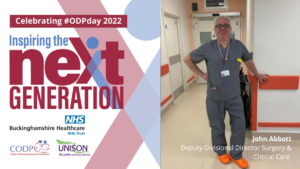 John Abbott, Deputy Divisional Director Surgery and Critical Care
John Abbott, Deputy Divisional Director Surgery and Critical Care
How it all began: I started out as a porter at St John & St Elisabeth Hospital in Swiss Cottage for a summer job where my sister worked as a nurse. I soon started working in theatres as an orderly doing surgical shave and theatre portering, but this just got me hungry for more. I was applying tourniquets and supporting the anaesthetic side more and more until a consultant anaesthetist call Dr Desh Talwatte said, “Why don’t you go and apply for your Operating Department Assistant training?” And the next thing I knew I was undertaking my training at North Middlesex Hospital, qualifying in 1988.
In 1990 I then moved to Charing Cross Hospital, got my first Senior Operating Department Assistant (ODA) post in1992, then rapidly moved up the ranks to Principal ODA before becoming one of the youngest Theatre Managers in the country. But I did not stop there, and moved on to General Manager of Theatres & Critical Care and then in 2008 I was tempted to Buckinghamshire by the opportunity to become Deputy Divisional Director.
What attracted me to the ODP role: The main thing that attracted me to the role was the potential for diversity of role. I especially like the option of undertaking Scrub, Anaesthetics or Recovery. There are so many avenues to explore – with the patient front and centre of everything we do.
How has my ODP training and experience helped me progress to my current role: Being an ODP has given me discipline, flexibility and a desire to deliver excellent patient-centred care.

